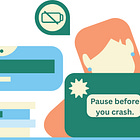The Tiny Cracks We Miss Before Burnout
Why ignoring the little stuff can backfire, and how to notice it before it piles up.
Hey, checking in, because the quiet stuff matters too. Today’s reflection: how burnout rarely crashes in all at once. It sneaks in through the tiny cracks we don’t always notice.
We often picture burnout like a dramatic movie scene: someone collapses on their desk, quits their job in a blaze of glory, or announces a breakdown on social media. There’s music swelling, tears streaming, maybe even a cinematic montage leading up to the crash.
But that’s not how burnout usually works.
Most of the time, it creeps in slowly, so slowly that we don’t realize what’s happening until we’re already knee-deep in it. It doesn’t arrive as a fire alarm. It arrives as hairline fractures: the micro-fissures in our energy, our patience, our ability to care. It’s not the big obvious breakdown that gets us; it’s the tiny things that wear us down until we’re too depleted to function.
And that’s the problem: we only recognize burnout once we’ve hit the emotional cliff. We rarely talk about the subtle signals that come before the emotional cliff: the struggles we don’t see.
The gap we miss
Here’s the tricky part: those tiny cracks are so easy to dismiss. We call them “just stress” or “just a busy week.” We brush them off, because who hasn’t felt a little worn down?
But the cracks add up.
You forget small things; not because you’re getting older, but because your brain is overloaded.
Your sense of humor thins out. The things you used to laugh at now irritate you. A friend’s teasing feels like criticism. A meme that once made you snort is now just another notification.
Rest stops working. You sleep, but you wake up tired. You watch a show, but it doesn’t feel like a break. You take a vacation, but somehow you return needing… another vacation.
Resentment creeps in. Work, family, or projects you once cared about start to feel like obligations dragging you by the ankle.
These are the cracks. Not dramatic. Not headline-worthy. Just small enough to be overlooked, until suddenly they’re not.
And when we miss them, we end up in the stage where decision fatigue sneaks up on you, turning even small choices into a challenge. You’re paralyzed over what to eat for dinner. Choosing a new show feels like a test you’re destined to fail. Even answering a text feels like scaling a wall.
The cracks don’t just wear down your energy. They erode your sense of agency.

How cracks sneak into daily life
Picture a Tuesday morning. You’ve already hit snooze twice because sleep didn’t quite refill the tank. By the time you open your laptop, there are twelve unread emails marked “urgent,” a Slack ping reminding you of a meeting you forgot to prep for, and a grocery list taped to the fridge daring you to remember it later.
None of these things is catastrophic. But together, they’re sandpaper. You feel it when choosing breakfast feels impossible, so you settle for coffee and hope for the best. You feel it when someone asks, “How’s your day going?” and you want to answer honestly but settle for “fine” because honesty feels too heavy. You feel it in the background hum of irritation that flares when a colleague adds an unnecessary “quick question” to your plate.
The day isn’t a crisis. It’s a drip. And that drip is exactly how burnout arrives: not by knocking down the door, but by leaking through the ceiling until suddenly the whole room is wet.
How culture makes the cracks wider
What makes these tiny cracks harder to notice is that many of them are quietly reinforced by the systems we live in.
Workplaces, for example, often celebrate endurance more than balance. Answering late-night emails gets a nod of respect. Logging off on time raises eyebrows. The subtext: your worth is measured by how much of yourself you spend.
Technology adds another layer. Notifications don’t just alert us; keep tugging at our attention like a toddler on your sleeve: hard to ignore, harder to soothe. Even leisure spaces online — scrolling TikTok, checking Instagram — can feel less like rest and more like competing highlight reels.
And then there are social rituals. How many times have you said “busy, but good” when asked how you’re doing, even if “exhausted and teetering” would be more accurate? We’ve created a cultural script where “good” is the acceptable answer, which means the cracks stay hidden under a smile.
All of this matters because burnout isn’t just personal. It’s shaped by the waters we swim in. The more our environments reward constant availability and polished resilience, the easier it is for those small cracks to spread unchecked.
Why we overlook the cracks
Part of the reason burnout is so slippery is because its early signs masquerade as ordinary life. They look like quirks, bad moods, or temporary rough patches. Nothing that sets off alarms.
We normalize them. “Everyone’s tired.” “Everyone’s stressed.” “This is just what being an adult is like.” We swap exhaustion stories at brunch like it’s a badge of honor. (Spoiler: it doesn’t have to be.)
We rationalize them. “This week is hectic, but next week will be better.” Except next week usually comes with its own chaos: the late-night deadline, the school form you forgot, the “quick call” that hijacks your afternoon.
We mislabel them. Instead of seeing cracks for what they are, we call ourselves lazy, unmotivated, or inconsistent. We shame ourselves for what is, in reality, a symptom of burnout in progress. It’s a cruel trick: not only do we feel depleted, we also blame ourselves for being depleted.
And by the time the cracks widen into collapse, we feel blindsided. But looking back, the signs were there.

A different way to see burnout
What if we shifted the way we think about prevention? Instead of waiting for the collapse, what if we treated the micro-cracks with the same seriousness as the fire alarm? After all, emotional hygiene works best when it’s part of everyday care, not just when alarms go off.
We don’t brush our teeth only when there’s a cavity. We brush daily, not because our teeth are in crisis, but to keep them from getting there. Burnout deserves the same maintenance mindset.
This shift matters, because it reframes burnout prevention from being about heroic recovery to being about small maintenance. You don’t need to book a retreat in Bali to stave off collapse. Sometimes what you need is a five-minute pause, a bit of compassion, or an honest check-in about what’s actually draining you.
Gentle solutions for the cracks
Here’s the hopeful part: cracks can be patched before they spread. The fixes don’t have to be dramatic or perfect. They just need to be consistent.
Micro check-ins. Once a day, ask: What drained me today? What nourished me? Not a big journal entry. Just two simple notes. Over time, patterns show up, and those patterns are clues.
Respect irritability as a signal. If you’re snappy, it doesn’t mean you’re “bad at coping.” It means your reserves are low. Treat it like the warning light in a car, not a character flaw.
Tiny pauses. A five-minute walk. A phone on airplane mode while you eat. Even small resets add up when done consistently.
Redefine recovery. Self-care isn’t a reward you earn after burnout. It’s maintenance. It belongs in the everyday, not the emergency.
Catch the cliff early. If you feel yourself teetering, it’s okay to step back before collapse. You don’t need to justify needing rest. You just need it.
Reassurance
Noticing cracks isn’t weakness. It’s strength. It means you’re tuned in enough to make small adjustments before the whole structure gives out.
Burnout prevention doesn’t have to be heroic. It just has to be consistent. And maybe the real skill isn’t learning how to recover from collapse; it’s learning how to keep the structure from collapsing in the first place.

My own check-in this week
One thing that grounded me: discovering a perfectly ripe avocado at the exact right time of day.
One thing that ungrounded me: accidentally liking someone’s Instagram post from 2017 while trying to zoom in.
Your turn: what’s one small choice, grounding or ungrounding, that shifted your week?
If you’re new here, welcome to Joydify, your soft landing for the quiet stuff that matters.
Thanks for subscribing to Joydify and sharing a quiet moment with us. Here’s to gentle support, one check-in at a time.


